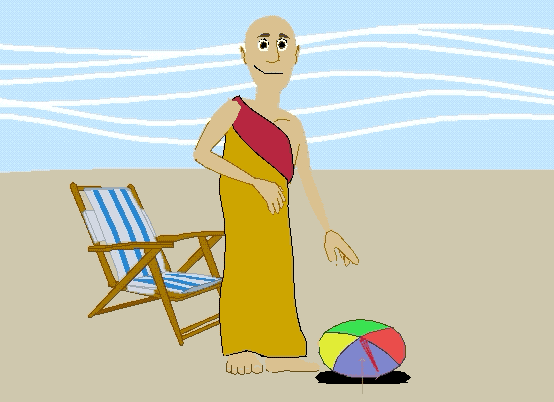Solitude Day. This is a time for Wiccans and Neo-Pagans to spend the day (or at least part of it) by themselves, mediate in solitude, and reconnect with their "inner selves." Take a quiet walk in the woods or stroll down a deserted beach and listen to the music of the sea. Explore an old barn or write a Goddess-inspired poem.
_________________________________________________________________________________
We know the story of Demeter and Persephone: Hades, king of the underworld, lusts after Kore and kidnaps her while she's picking flowers in a sunny meadow. Refusing to let anything grow until she gets her daughter back, Demeter, the grain mother, makes a deal with Hades that allows Kore -- now called Persephone, "She Who Destroys the Light" -- to return to the upper world. The story is allegorical. Vegetation dies for a season. The Eleusinian Mysteries perhaps revealed the mysteries of life and death contained in a seed.
In Lost Goddesses of Early Greece, Charlene Spretnak retells an earlier version of the story, without the rape. Humankind lives in a happy land of perpetual spring. Grain and flowers are ever growing, ever blooming, and no one has a care in the world. One day Persephone hears whispering in the meadow. It seems to be coming from beneath the roots of the flowers and grass. She investigates and discovers that she's hearing the whispers of the dead, who exist in a half-life in a shadowy place under the earth. She feels sorry for them and, talking three poppies and three sheaves of wheat, she descends under the earth. She tells the dead souls that she has come to be their comforter and their queen. After she paints their foreheads with the juice of the poppy to initiate them into new life, they are ready for rebirth.
Reader, instead of seeing pale Persephone on her dark throne, let's build a new picture in our minds. Let's see young Persephone sitting among the shades of the dead -- alone. She's telling them stories and singing to them. She's holding their hands, caressing their cheeks, reminding them of the joys and sorrows of life. When they're ready, she sends them back up to the land of the living (Andinger - Pagan Every Day pg86).
_____________________________________________________________________________________________________
Comparative folklorist Joseph Campbell once wrote, "Read myths. They teach you that you can turn inward, and you begin to get the message of the symbols." Born in New York City on this day (March 26th) in 1904, Campbell gained fame for his 1948 book The Hero with a Thousand Faces, which studied the archetype of the hero in Native American, Greek, Hindu, Buddhist, Mayan, Norse, Biblical, and Arthurian legends. His concepts were intricately woven into film director George Lucas's scripts for the "Star Wars" trilogy. Campbell's multi-volume Historical Atlas of World Mythology was only partially completed by the time of his death in 1987.
Joseph Campbell was a Pagan.
_________________________________________________________________________________
We know the story of Demeter and Persephone: Hades, king of the underworld, lusts after Kore and kidnaps her while she's picking flowers in a sunny meadow. Refusing to let anything grow until she gets her daughter back, Demeter, the grain mother, makes a deal with Hades that allows Kore -- now called Persephone, "She Who Destroys the Light" -- to return to the upper world. The story is allegorical. Vegetation dies for a season. The Eleusinian Mysteries perhaps revealed the mysteries of life and death contained in a seed.
In Lost Goddesses of Early Greece, Charlene Spretnak retells an earlier version of the story, without the rape. Humankind lives in a happy land of perpetual spring. Grain and flowers are ever growing, ever blooming, and no one has a care in the world. One day Persephone hears whispering in the meadow. It seems to be coming from beneath the roots of the flowers and grass. She investigates and discovers that she's hearing the whispers of the dead, who exist in a half-life in a shadowy place under the earth. She feels sorry for them and, talking three poppies and three sheaves of wheat, she descends under the earth. She tells the dead souls that she has come to be their comforter and their queen. After she paints their foreheads with the juice of the poppy to initiate them into new life, they are ready for rebirth.
Reader, instead of seeing pale Persephone on her dark throne, let's build a new picture in our minds. Let's see young Persephone sitting among the shades of the dead -- alone. She's telling them stories and singing to them. She's holding their hands, caressing their cheeks, reminding them of the joys and sorrows of life. When they're ready, she sends them back up to the land of the living (Andinger - Pagan Every Day pg86).
_____________________________________________________________________________________________________
Comparative folklorist Joseph Campbell once wrote, "Read myths. They teach you that you can turn inward, and you begin to get the message of the symbols." Born in New York City on this day (March 26th) in 1904, Campbell gained fame for his 1948 book The Hero with a Thousand Faces, which studied the archetype of the hero in Native American, Greek, Hindu, Buddhist, Mayan, Norse, Biblical, and Arthurian legends. His concepts were intricately woven into film director George Lucas's scripts for the "Star Wars" trilogy. Campbell's multi-volume Historical Atlas of World Mythology was only partially completed by the time of his death in 1987.
Joseph Campbell was a Pagan.




